Gregory A. Fournier's Blog, page 39
February 2, 2014
The Rainy Day Murders Progress Report
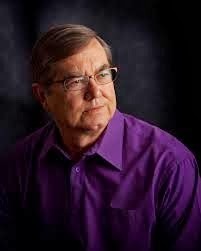 On Monday, I completed the first full draft of The Rainy Day Murders (RDM) about John Norman Collins (JNC) and the Washtenaw County sex slayings of seven defenseless young women in the late 1960s.
On Monday, I completed the first full draft of The Rainy Day Murders (RDM) about John Norman Collins (JNC) and the Washtenaw County sex slayings of seven defenseless young women in the late 1960s.The dark shadow of time has obscured the facts of this once prominent case that History seems to have unwittingly forgotten. Institutional neglect has taken its toll on the truth story of this case also. The trial transcripts have been purged, and no microfilm, microfiche, or digital files were made of these Washtenaw County court documents. It is tough for me to understand that.
Invoking The Freedom of Information Act (FOIA), my researcher and I requested and received many documents from the Ann Arbor City Attorney's office, the Michigan State Police, the Michigan Department of Corrections (MDOC), and several other governmental agencies.
Not honoring our FOIA requests at all were the State of California and the Ypsilanti City Attorney's Office. Their refusal to comply, for whatever reasons, forced us to seek information from other sources.

Lucky for us, the Ypsilanti Historical Society, the Halle Library on the campus of Eastern Michigan University, and the Ypsilanti Public Library archives were all open and available for our use. We have carefully gleaned facts and quotes from news clippings from across the state of Michigan to faithfully reconstitute the court proceedings.
Part one of The Rainy Day Murders will discuss the facts of each of the young women's cases including new living history accounts seasoned with forty-five years of hindsight. Part two of this book will be the restored court proceedings of these murders from 1969-1970. Part three of RDM will cover an area never before written about to any great extent, JNC's prison years.
The prison years tells of Collins life and times behind bars and his attempts to legally and illegally get out of serving his full life sentence in Michigan prisons. This section also goes into his attempts to manipulate the media and shape public opinion. To round out the prison years, we have come into possession of twenty recent JNC prison letters which will add new information to the canon of this case.
At this writing, I plan to end the book with JNC's alibi defense claiming to his Canadian cousin that Collins was innocent of the murder of Karen Sue Beineman. He names the person who testified against him in court as her murderer and implicates this same person in two other murders.
This makes for fascinating reading but my treatment of this case will be a true crime account; Collins' elaborate fantasy defense is clearly fiction. So this book will have something for everyone.
From the facts and circumstances presented, I leave it up to the reader to decide the guilt or innocence of JNC. The other six cases will never be formally brought against Collins. What's the use? He is locked down and his days are numbered.

Published on February 02, 2014 05:00
January 28, 2014
San Diego State University Writers' Conference

This past weekend, January 25-26th, I went to the "2014" San Diego State University Writer's Conference to shop The Rainy Day Murders around and see if I could generate some professional interest in it.
This annual event matches writers with editors and agents, not so much to provide an active marketplace, but more to educate writers about the very complicated and evolving book business. It's impossible to be successful in publishing if you don't understand the rules of the business.
At one time, new authors could directly approach a publishing house with an unsolicited manuscript. In today's market, without the help of a literary agent, that door is closed to all but a few proven cash cows. Now, writers must query agents and/or editors to inspire them enough to take a chance on you.
That's not as easy as it sounds because they all seem to be "Looking for the next new thing." Agents don't get paid by the writer; they work on a 15% book contract commission, so the competition is cutthroat.
I signed up for two Advanced Readings of the first ten pages of my newly completed manuscript in its first full, unedited form. One of the readings was with an editor and the other with an agent.
The agent suggested that I redo my beginning to strengthen my personal connection to the John Norman Collins story. This was counter-intuitive to me as non-fiction should strive to be as objective as possible. "Not necessarily anymore," she said. After I gave her remark further thought, she may have helped me solve a narrative problem that's been troubling me.
My second reading was with an editor who was more positive and encouraging. Of all the submissions he reviewed over the weekend, he said he liked mine the best and recommended me for an editor's "Choice" award. The award is not meant to be a publishing offer of any kind; it is meant to encourage writers to stick with it.

After I make a complete revision and edit, I look forward to entering the marketplace and attracting some professional interest in The Rainy Day Murders.
If I am unsuccessful in attracting a publisher, my true crime book will see the light of day, even if I have to self-publish it. This is a story that has waited a long time to be told. Too long!
Published on January 28, 2014 13:49
January 26, 2014
Guest Post - John Philip Chapman - John Norman Collins' Canadian Cousin
 University of Toronto graduate, John Philip ChapmanFinally, I've finished the first complete draft of The Rainy Day Murders, my true crime treatment of the Washtenaw County Murders. In the coming weeks, I need to revise and finish the supplemental material and take it to the marketplace.
University of Toronto graduate, John Philip ChapmanFinally, I've finished the first complete draft of The Rainy Day Murders, my true crime treatment of the Washtenaw County Murders. In the coming weeks, I need to revise and finish the supplemental material and take it to the marketplace. Once I get an agent and a publisher, I'll have a better idea of a publication date. My grateful thanks to those many people who helped me tell the most complete account of these cases to date. You know who you are.
John Norman Collins' Canadian cousin, John Philip Chapman wanted to explain his involvement with this project in a guest post. Here it what he had to say.
***
My name is John Philip Chapman, and I live in Mississauga, Ontario, Canada. I am now 41 years old, an only child and the Canadian cousin of John Norman Collins. Thirty-two years ago, I was introduced to my cousin – John Norman Collins for the first time.
It was in early March of 1982, just a week before my 10th birthday. At the time and because of my age – my parents only told me that I had a cousin who was in prison and that he wanted to correspond with me. Given my young age and inability to comprehend the nature of his crimes, I was never told what they were nor the details of his actions. Some would say that ignorance is bliss. At this point, nothing was further from the truth.
From Day One, both my cousin and I had informally adopted the “Don’t Ask..Don’t Tell” policy concerning the crime for which he was accused and found guilty of. I was curious to know the truth, but, yet afraid of what I might find out.
At the beginning, through our letters and phone calls back and forth, I came to know this man as a kind, considerate and thoughtful person who dispensed great advice and was very understanding of the trials and tribulations that come with being a teenager and with all the new discoveries that come with that right of passage.
A whole new world of opportunities was opening up for me – first job, first girlfriend, first examinations, first drink, first attempt at driving. However, with all these opportunities, I found myself being comforted in talking about these things with someone who regarded me as his proverbial “little brother” and who imparted on me words of wisdom and many comical anecdotes. As a teenager, this was someone that I respected and cared for – he was family.
In the years that followed, however, things began to change and something seemed “off” where my cousin was concerned, but I made the mistake of ignoring those warning signs and I continued to communicate with him – if anything because I felt a familial obligation to do so, and partially because I was an introverted person with no siblings. My cousin “appeared” to be understanding and compassionate. I would soon come to realize that my suspicions were well founded
In May of 2013, as I casually browsed through the internet, I was overcome with the innate curiosity to look up my cousin’s name via Google and see what I could discover. After all, what harm could that do? Looking back on that day, I could not, at the time, have ever imagined what I would find. I spent the next four hours reading information and articles concerning my cousin – nicknamed “The Co-Ed Killer”.
However, I had come across the name of a gentleman who was writing a book called “The Rainy Day Murders” and who was looking for information concerning my cousin. Because I was confused and perplexed with what I had read about him, I decided to send this person an e-mail; then, we decided to meet in person.
In meeting with Greg Fournier and his associate, Ryan Place, I was convinced that their work was an honorable thing to do in paying not only tribute to those women who lost their lives but to those who remained behind – those mothers and fathers, brothers, sisters, and relatives and friends who were left to pick up the pieces after their traumatic losses.
The book they are just finishing promises to be the most accurate, detailed, and honest account concerning the circumstances surrounding the deaths of seven young women and the life of John Norman Collins. Over the next several months, I continued to write my cousin and correspond via e-mail with him in an attempt to obtain his side of the Karen Sue Beineman issue and to gain perspective into the mind of John Norman Collins – all for the benefit of this book. What I found was truly disturbing on so many levels.
Over the next several months, I learned a great deal about the crime that my cousin was charged with and found guilty of. Never in my wildest imagination could I have ever thought that such violent, horrendous, and despicable actions could possibly be committed by someone I am related to. Over these months, I came to understand the delusional reality that my cousin lives in and thrives on daily.
I saw, for the first time in thirty years, that my cousin was and still is a master manipulator – a true Machiavellian in every sense of the term. As long as the end justifies the means for John – he does it. His attitude today towards women and womanhood are absolutely misogynistic, despicable, and clearly the words of someone who still has a great deal of anger towards women in general.
John looks out for one person and that is himself, and he routinely uses emotional blackmail to obtain his desired result. John shows zero remorse towards the lives of these young women and for his part in these crimes. He shows a callous disregard for his participation in these events.
For my cousin John to admit any guilt and/or accept any responsibility for his actions would be a sign of weakness to him. My cousin has a typical alpha-male personality that clearly shows through his many letters and e-mails over the past year.
With that in mind, I want to take this opportunity to thank both Greg Fournier and Ryan Place for helping me to realize and come to terms with the monster that is my cousin, John Norman Collins.
The disgust and contempt that I felt for my cousin was not enough to dissuade me from communicating with him because I knew in the end that any information I would obtain, would only benefit "The Rainy Day Murders”.
Helping them turned out to be a real pleasure for me and an experience that I feel very proud to have been a part of. In the end, I lost a cousin but gained two friends who have shown a great deal of integrity in dealing with the sensitive nature of this book. It is to them and this book that I wish all the best for.
For the families of the seven young women, whose lives ended far too soon – I can only express my sincere and heartfelt sympathy and apologies for what happened to your daughters, sisters, and nieces. These women had their whole lives ahead of them, and bright futures – sadly futures that would never come to be – all because of the violent madman that is my cousin – John Norman Collins.
To those who were left behind, I wish that I could take away your pain and suffering, but sadly I am not able to do that. However, my heart goes out to you all for your courage and strength in dealing with the loss of your loved ones. It's impossible to get over such a deep loss, especially under these circumstances. It is my hope that this book will offer you some measure of peace.
Neither myself or any member of my family has ever condoned the actions of my cousin and we do not support him in any way, shape, or form.
Speaking for myself, my cousin is a disgusting, psychologically disturbed pervert that I am, in no way, afraid of. To be afraid of him would be to allow him to have that kind of power over me, and I simply refuse to allow that to happen.
John Norman Collins is a monster - straight up! Because of this, I have taken every legal avenue at my disposal to ensure that my cousin never ever will be able to transfer to a Canadian prison and thus ensure an early release.
As of January 10, 2014, I am proud and happy to say that after three months of addressing and taking care of this important legal matter (at some personal expense to myself) the case is now closed and John Norman Collins WILL spend the rest of his natural life in Marquette Branch Prison where he belongs. If anything, I hope this fact will offer people out there some added measure of comfort and security.
Published on January 26, 2014 05:00
January 21, 2014
John Norman Collins on the Prowl
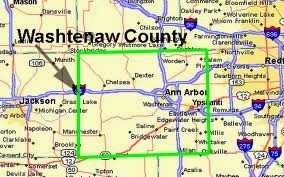
The court of public opinion has long held that John Norman Collins (JNC) is culpable in the murders of seven young women in Washtenaw County, Michigan from 1967-1969.
To be precise, six of the girls were from Michigan and one was from Milwaukie, Oregon. Roxie Ann Phillips was visiting a family friend in California when she crossed paths with JNC. One of the original seven victims, Jane Mixer, was found in 2005 to have been murdered by someone else, Gary Earl Leiterman.
It is well-known and documented that JNC prowled the streets of Ypsilanti. Five women testified that he tried to pick them up, all within a forty-five minute window before he picked up Karen Sue Beineman. Collins gave her a ride to a wig shop before he brutally killed her in his uncle's basement. So said The People of Washtenaw County.
But did JNC ever pose the same threat to young men? Although that isn't the subject of The Rainy Day Murders, several men have come forward with stories about their brushes with Collins. Without corroboration, their anecdotes have no evidentiary value, yet that doesn't mean that their stories are untrue. To date, it is unknown if JNC had any young male victims.
One of the men who contacted me was clearly more disturbed about his brush with Collins than the others. I placed a call to this person who went by the handle of Atlanta Tom. He didn't want to reveal his true identity to me at first. His memory of the incident stills haunts him after forty-four years, and he had difficulty telling his story.
When JNC was arrested and his perp walk photograph appeared all over the television news and front page reports, Tom finally knew the name of the man who tried to assault him five months earlier.
I was skeptical at first because he couldn't express his story and his feelings coherently. We were both getting frustrated, but I could sense he was uncomfortable and having trouble collecting his thoughts.
Then we began talking about Eastern Michigan University's
campus during the late Sixties and discovered that we had mutual acquaintances and ran in the same circle of people we loosely called "freaks." I was a few years ahead if him at Eastern.
When Atlanta Tom finally settled down, I asked him to tell his story again from the beginning. Now, I was able to stitch my initial notes together and discover his story.
In a subsequent phone call interview, he allowed me to tell his story though he confessed he was uncomfortable about it. He always felt "guilty" because he didn't report the incident to the police. In the month after his incident, another young women was brutally slaughtered in the area. By July, four more had lost their lives.
"You were young and afraid," I reassured him. "Maybe you could have changed history and saved those girls, maybe not. Besides, you couldn't identify him by name at the time."
"That's not all," he said. "My name is Tom Zarski. I'm the guy who called 'Uncle Russ' on the radio with the 'Is Paul (McCartney) Dead?' story, which quickly became the 'Paul Is Dead!' story. That was in February of 1969. I didn't think anyone would believe me after that."
Here is Tom's story as told to me. Believe it or not!
***
"While hitchhiking home to Bloomfield Hills from EMU on a late Friday afternoon in February, I was picked up by a person who told me to get in, and then he asked me for my name. 'Tom,' I said, hopping into his car with my laundry bag in tow.
Tom described himself as very unsure of himself and a very immature eighteen year old freshman, both physically and socially. He didn't feel comfortable at EMU and spent as much time home as he could.
Tom Zarski related to me that the person who picked him up in front of the Ypsilanti Police Department on Michigan Avenue looked three or four years older than he was. The driver's upper body build made him look like a college quarterback type with clean cut short haircut which wasn't popular in 1969. He looked out of place for the times. What Zarski remembered most about his benefactor was that he looked like a fraternity guy.
But something bothered him from the start. The driver "eyeballed" him and it made the hair stand up on the back of his neck. Then, when the driver started to speak, he was a quick talker and very slick.
Tom remembered being offered a free ticket to a Bob Seger concert at Eastern Michigan's Bowen Field House if he wanted to go. The guy said he had an extra ticket and would fix the shy freshman up with his sister who liked young guys.
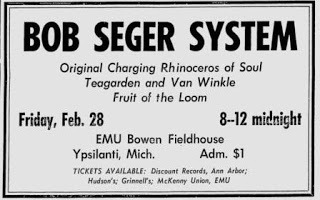 I was at this concert that night.This was all too much and too fast for the socially immature young man to process. "Why is this guy bothering with me, a scrawny, immature kid? All I could think of was that he wanted something. I told him that my father was waiting for me to come home for the weekend, and I couldn't change my plans. But thanks anyway."
I was at this concert that night.This was all too much and too fast for the socially immature young man to process. "Why is this guy bothering with me, a scrawny, immature kid? All I could think of was that he wanted something. I told him that my father was waiting for me to come home for the weekend, and I couldn't change my plans. But thanks anyway.""Within ten minutes of being picked up, his friendly attitude abruptly changed as he slammed on the brakes before dumping me off on the shoulder of Interstate 94 east, just before the Rawsonville exit. 'Go ahead! Get out!' he commanded as he spun his wheels leaving me in a cloud of blue exhaust.
 "He took off and I stuck out my thumb trying to get a ride hitchhiking, walking backwards towards Detroit's Metropolitan Airport. When I got there, I thought, I would call my father and tell him I'd be late. Then I could catch an airport shuttle to Bloomfield Hills. That was my plan.
"He took off and I stuck out my thumb trying to get a ride hitchhiking, walking backwards towards Detroit's Metropolitan Airport. When I got there, I thought, I would call my father and tell him I'd be late. Then I could catch an airport shuttle to Bloomfield Hills. That was my plan."As I continued to walk east, I heard someone yelling my name from an overpass. 'Tom! Tom! Tom!' By now, it was dark and I couldn't make out who it was. But nobody knew me around there, and it struck me that I had told the guy who picked me up my name. 'What's he want now?' I thought. Trying not to panic, I ignored him and kept walking with my thumb out having no success getting a ride.
"As I approached the next freeway exit, I noticed a car was parked with it's headlights on and pulled over on the exit's right shoulder. The car's trunk was open, but the high beams were so bright that I couldn't recognize the car or anything else in the darkness.
"The next thing I knew, I heard the trunk slam and a lanky figure began running me down swinging a tire iron at me. It was the same guy who was now trying to attack me. I saw a panel truck pull over about fifty yards up the freeway from where I had just come. Fueled by fear, I outran my stalker.
Three farm workers hauling potatoes had stopped and congregated around the truck's front right tire to take a bathroom break so they wouldn't be seen by oncoming traffic.
"I ran up to them with my laundry bag slung over my shoulder and asked if I could have a ride. Someone was trying to attack me. They looked and saw a shadowy figure walking towards the freeway entrance ahead.There is safety in numbers and they said 'Sure.' All four of us squeezed onto the front bench seat.
"Clinging to my laundry bag, I saw the guy standing on the shoulder as we went by giving me a crazed look and shaking his head slowly with his arms crossed over his chest. The crow bar must have been hidden behind his back.
"My rescuers dropped me off at Merriman Rd., and I walked the rest of the way to Metro Airport looking over my shoulder the whole way scared to death. By the time I made it home, I was a nervous wreck. Shaking, I told my father, 'Someone tried to kill me tonight.'
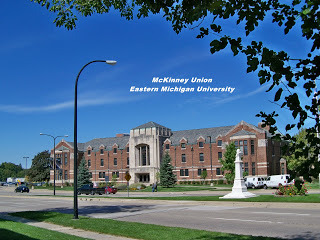 "Two days later on the following Monday, I was hanging out in the McKenny Union snack bar, a recent addition to the newly remodeled Student Union building. It had large, modern window panels on three sides of the addition for natural lighting. A sidewalk ran between these large windows and Welch Hall next door that formed a bottleneck for students walking during class change.
"Two days later on the following Monday, I was hanging out in the McKenny Union snack bar, a recent addition to the newly remodeled Student Union building. It had large, modern window panels on three sides of the addition for natural lighting. A sidewalk ran between these large windows and Welch Hall next door that formed a bottleneck for students walking during class change."I saw some sort of fraternity demonstration going on outside, so I went up to the large window to get a better look. Much to my stark terror, there he was, the same guy who tried to attack me Friday night. He was leading the parade, cavorting, and goosestepping in rubber boots.
"He looked into the snack bar window and our eyes locked. I saw an expression of horror on his face. He recognized me right away and did a 180 degree turn and ran towards W. Cross St. He was probably afraid I would call the police on the spot."
"Why didn't you?" I prompted.
"My father wanted me to make out a police report, but I let my friend talk me out of it. She told me, 'Why get further involved?' Now, I wish I had."
Published on January 21, 2014 07:40
January 16, 2014
Eastern Michigan University Student Queried - "Is Paul (McCartney) Dead?"
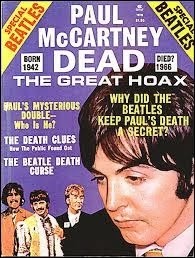 The biggest hoax in the history of Rock & Roll is surely the "Is Paul Dead?" controversy. On Sunday evening, October 12, 1969, Thomas Zarski, an Eastern Michigan University student, called "Uncle Russ" Gibb, a concert promoter and popular D.J. at Detroit's underground music radio station - WKNR-FM.
The biggest hoax in the history of Rock & Roll is surely the "Is Paul Dead?" controversy. On Sunday evening, October 12, 1969, Thomas Zarski, an Eastern Michigan University student, called "Uncle Russ" Gibb, a concert promoter and popular D.J. at Detroit's underground music radio station - WKNR-FM.On the air, Zarski asked Gibb what he knew about the death of Paul McCartney. This was the first the D.J. had heard of it. "Have you ever played "Revolution 9" from the The White Album backwards?" Zarski asked.
Gibb hadn't. Skeptical, he humored his call-in listener and played the song backwards. For the first time his audience heard, "Turn me on, dead man." Then WKNR's phone started ringing off the hook.
Apparently, the rumor started when Tim Harper wrote an article on September 17, 1969 in the Drake University (Iowa) newspaper. The story circulated by word of mouth through the counter culture underground for a month until Zarski caught wind of it. He called Uncle Russ asking about it. Gibb had solid connections with the local Detroit and British rock scene because he was the Grande Ballroom concert promoter.
University of Michigan student Fred LaBour heard the October 12th radio broadcast and published an article two days later in the October 14th edition of The Michigan Daily as a record review parody of the Beatles' latest album Abbey Road. This article was credited for giving the story legs and was the key exposure that propelled the hoax nationally and internationally.
The legend goes that Paul died in November of 1966 in a car crash. The three categories of clues were:
Clues found on the album covers and liner sleeve notes,Clues found playing the records forward, and Clues found playing the records backwards.The clues came from the albums:
Yesterday and Today,Sergeant Pepper's Lonely Hearts Club Band,Magical Mystery Tour,The Beatles (the "White Album"), andAbbey Road.Some people thought that the Beatles masterminded the hoax because of the large number of clues. They thought there were too many for this story to be merely coincidental.
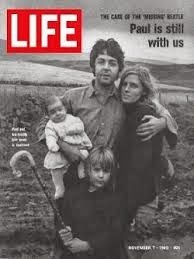 The story peaked in America on November 7th, 1969 when Life magazine ran an interview with Paul McCartney at his farm in Scotland, debunking the myth.
The story peaked in America on November 7th, 1969 when Life magazine ran an interview with Paul McCartney at his farm in Scotland, debunking the myth. For more detailed information on the myth and the clues, check out these links:
http://turnmeondeadman.com/the-paul-is-dead-rumor/
http://keenerpodcast.com/?page_id=602
Video link: https://mail.google.com/mail/?tab=wm#inbox/1439f29248c26d2d?projector=1
Published on January 16, 2014 16:55
January 12, 2014
Keeping Serial Killers Alive in Los Angeles County Jail - Dr. Vonda Pelto, Ph.D
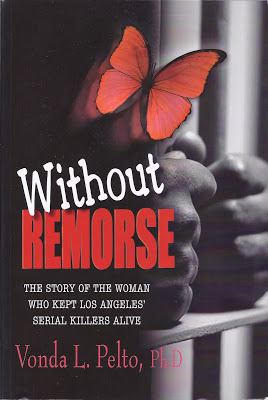 In addition to spending untold hours reading and doing field research for The Rainy Day Murders, my researcher and I have also conducted hundreds of phone and in-person interviews with people who have had some connection with the John Norman Collins case or who have worked in the field of forensics and have some clinical psychology background with serial killers. It's been quite a learning experience.
In addition to spending untold hours reading and doing field research for The Rainy Day Murders, my researcher and I have also conducted hundreds of phone and in-person interviews with people who have had some connection with the John Norman Collins case or who have worked in the field of forensics and have some clinical psychology background with serial killers. It's been quite a learning experience.Last September, I met with Dr. Vonda Pelto at the train station in San Juan Capistrano. I drove up from San Diego, and she drove down from Long Beach, so we could meet and discuss serial killers over lunch. Although this topic doesn't make for good dining conversation generally, she and I had a lively and spirited visit.
Dr. Pelto's job for three years in the 1980s was to keep Los Angeles County Jail's serial killer population alive so they could stand trial. It was a unique job nobody wanted, but she was a single mother of two with a new psych degree who needed a job desperately.
The backstory of the job was that "In the late part of 1980, one of the Freeway Killers, Vernon Butts, was arrested and confessed that he and William Bonin had used various knives, ice picks, acid, and chloral hydrate in the commission of six murders. Butts later admitted that he was there but contended that Bonin actually committed the crimes."
LA County prosecutor, John Van de Kamp, offered a plea bargain to Butts rather than the death penalty. Van de Kamp offered Butts life in prison if he would roll over on his partner, William Bonin.
Dr. Kline, head of the Forensic Outpatient unit at the men's jail explained to Dr. Pelto at her job interview that:
"Butts was poised to testify against his friend, when he became despondent and tired of incarceration. He made the choice to end his life. Hanged himself!
"The District Attorney was mad as hell at us, the press had a field day, and we got a lot of heat over it. Believe me, we can't ever let that happen again.
"Dr. Pelto, after Butts' suicide, we decided to create a new position in the jail's forensic team. We want someone to see the high profile inmates, the men whose names and faces are featured predominately in the news media. That's the job we're offering you....
"The main thing is we have to keep these guys alive during their incarcerations. The State wants the opportunity to extract its own revenge."
***
For seven years prior to this job, Dr. Pelto had worked with
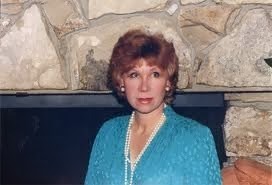 Dr. Vonda Pelto, Ph.Dsexually molested victims and their perpetrators for Orange County Mental Health. She couldn't imagine that the felons in jail could be much worse. So she reluctantly took the job.
Dr. Vonda Pelto, Ph.Dsexually molested victims and their perpetrators for Orange County Mental Health. She couldn't imagine that the felons in jail could be much worse. So she reluctantly took the job.After thirty-some years away from that traumatic environment, Dr. Vonda Pelto was finally able to collect her thoughts and write a memoir of her experiences called Without Remorse, published in 2012.
Pelto writes about the Hillside Stranglers, Kenneth Bianchi and Angelo Buono; the Freeway Killers, Jim Munro and William Bonin; the Sunset Strip Killer, Doug Clark; the Trash Bag Murderers, Elihua Komerchero, Joseph Zakaria, and Yehunda Avital; Arthur Jackson, attempted murder of Theresa Saldana; and wild card, John (The Wadd) Holmes, implicated in the Wonderland Murders.
Dr. Pelto would meet with these men in her office, a converted 8'x10' cell that was retrofitted with a Dutch door. Her work space was situated near the prisoners' phone bank. A barbers' chair was bolted to the floor, and the inmates would be handcuffed to the chair whenever they came in to see her. Usually, inmates were brought in one at a time to be evaluated but not always.
Dr. Pelto's book not only tells her stories of interacting with these psychotic men, but it also tells her story of being a single mother working to raise two daughters. It tells of her long struggle to pass the California State Boards to become a clinical psychologist and go into private practice. Vonda reveals much about her self-doubt and her personal history with men that readers will find deeply revealing.
Dr. Pelto has sold the movie rights to Without Remorse and a screenplay is in development. I'll be anxious to see the movie when it comes out.
Check out this five minute video link of Dr. Vonda Pelto discussing Without Remorse. http://www.youtube.com/watch?v=0qOojVCekAs
Link to Without Remorse: http://www.amazon.com/Without-Remorse-Angeles-Serial-Killers/dp/0979585287
Published on January 12, 2014 04:37
January 8, 2014
John Norman Collins' Last Wish, "I Want To Die on Canadian Soil"
 In a recent letter to a Canadian Immigration official, John Norman Collins (JNC) expressed his desire to attempt another International Prisoner Exchange Treaty bid with the country of his birth.
In a recent letter to a Canadian Immigration official, John Norman Collins (JNC) expressed his desire to attempt another International Prisoner Exchange Treaty bid with the country of his birth.In 1981, Collins was one signature away from being transferred to a prison in Ontario near Toronto when a Marquette Prison inmate blew the whistle on him.
A letter fell on the desk of the night city desk editor at The Detroit Free Press, William Hart, who ran a story about it after intrepid reporter, Marianne Rzepka, corroborated the details. The story "Transfer to Canada For Killer" was run in the evening edition of the paper, and by morning, the Michigan Associated Press sent the story far and wide throughout the state's media network.
***
JNC took the words of Michigan Governor Rick Snyder to heart when he made a public statement about there being too many people in Michigan's prisons because of minor drug offenses and an aging prison population. He was sixty-six and one of the oldest inmates at Marquette Branch Prison.
In several prison letters to his cousin, JNC moans about his aches and pains, the indifferent medical staff, and the inadequate services available to him. What he doesn't mention to his cousin is that he often refuses to ante up his co-pay for medical services. I have several prison Administration Hearing documents that detail how JNC refuses to pay, and then he makes an issue of it.
Collins writes that he is a physical wreck from "too much weightlifting and playing hockey," though he still plays handball and basketball whenever he can. He complains about his bad knees, bum hip, and arthritic back, the simple ravages of the aging process many of us Baby Boomers suffer from.
Of a more serious nature was an incident that occurred in May of 2012, which he details in a September 7, 2013 letter to his cousin:
"I did have a scary moment last year. I was going to the Chow Hall with my friend, Big Mike and we just got outside the unit and I CRASHED to the concrete FACE FIRST. I thought I woke right up, BUTT, Big Mike told me I was out for a couple of minutes. I tried getting up but the guards told me to stay down. My face was a bloody mess.
"They took me to Health Care and there was a doctor there and he sent me immediately to the hospital in Marquette. At first they thought I had a heart attack or a stroke. They did over $100,000 of tests on me for a day and a half and found no bleeding in my brain, so they were CORNfused and couldn't find a cause."
JNC now hoped he could parley his private health concerns to portray himself as an old-timer who is a shadow of his former self and a danger to no one.
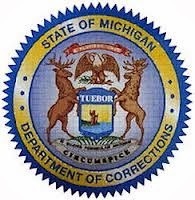 If he could only convince a sitting Michigan governor to pardon him or override the Michigan Department of Corrections (MDOC) revocation of his 1981 transfer application, he could be "home" in the country of his birth awaiting a work release program. Of course, JNC needed his Canadian cousin's help with a commitment to sponsor him, to provide a home for him, and to supervise his "reintegration into society." In short, to be responsible for him.
If he could only convince a sitting Michigan governor to pardon him or override the Michigan Department of Corrections (MDOC) revocation of his 1981 transfer application, he could be "home" in the country of his birth awaiting a work release program. Of course, JNC needed his Canadian cousin's help with a commitment to sponsor him, to provide a home for him, and to supervise his "reintegration into society." In short, to be responsible for him.***
In the same letter, JNC asked Chapman to visit him in Marquette Branch Prison which he had never done before. Shortly afterwards in an email to me, Chapman wrote:
"He does want to see me face to face for the first time and he wants my help, as he said neither (his brother or sister) have ever offered to 'put him up.' However, I am not sure what to do.
"I know who John is to me, regardless of what he has done in the past... however, never at any time, have I ever found myself afraid of him and I think I would be safe if I had him here. After all, his victims were all women, not men.
"But with that in mind, I am worried that if I was miraculously able to get him to Canada, I would worry that he might hurt some woman, and I just don't want that on my conscience.
"As well, I am aware of the relationship that he has with some of his "friends" in prison, and I use the term "friends" very loosely. I may be naive, but I am not stupid. So that concerns me. Would he try something on me? I am not being paranoid, just trying to protect myself and my mom.
"Let's say (hypothetically), if John did get back to Canada and I did sponsor him, do you honestly think that my Mom and I would be in danger? I am conflicted now"
My immediate response to John Philip Chapman was:
"John, your cousin is a hardened criminal. Straight up! His own mother had discipline problems with him. He has a self-professed anger management problem. Factor in forty-five years of pent up frustration and rage. I wouldn't take a chance."
John Philip Chapman's quick reply was:
"I will take your advice seriously and be very cautious moving forward with communications with my cousin. The interesting thing about all this is that if this were anyone else, Ted Bundy, Charles Manson, or any other serial killer, I would not even waste any time on the issue.
"I have been writing to him since I was ten years old and obviously too young to understand the kind of person he was then. As the years went by, I suppose I never outgrew that vision I saw of him in my head... but then the facts are what they are. John is NOT where he is by accident or a corrupt legal system... he deserves to be where he is. This is for society's protection and, I suppose, even for him.
"Greg and Ryan, THANK YOU VERY MUCH for not judging me or regarding me in the same circle as my cousin. I am who I am and John is who he is."
***
After nixing the trip to Marquette Prison, Chapman received an unexpected collect call from JNC. Collins needed to strengthen his grip on his wavering cousin and synchronize "their" strategy.
On September 13, 2013, JNC wrote to Chapman:
"I was so pleased with our phone call. I must admit that I was (a) bit nervous at first. I didn't know what to say. You sound so grown up now. Anyway, it was finally great to break the ice after so many months. You are the most important person in my life right now. I also consider you my best friend."
The message soon shifted into drawing Chapman into JNC's transfer conspiracy:
"We have to watch what we say about Frank (Collins' contact at the Canadian Consulate). I don't know how the process works over there, BUTT it is so easy for the MDOC to simply say no to everything. Hopefully a higher power (the governor) will take over and over-ride the MDOC (VETO)."
***
Early in October, Chapman wrote Collins saying he had been reading internet articles about him and didn't feel comfortable sponsoring him. This must have hit Collins like a punch in the face.
In an email dated October 7th, JNC began to panic and show desperation:
"I HOPE YOU HAVE HAD AN OPPORTUNITY TO THINK OVER YOUR DECISION. WHATEVER THEY SAID WAS A LIE JUST LIKE IT WAS 32 YEARS AGO WITH DELHEY (Washtenaw County Prosecutor). THEY USED THEIR EMAILS TO SCARE YOU. WHO IS IT THAT CONTACTED YOU?
"YOU HAVE WORKED TOO HARD AND TOO LONG TO LET THEM KEEP US FROM EACH OTHER. YOU HAVE KNOWN ME FOR OVER THIRTY YEARS AND THEM ZERO. THEY MADE YOU OVERACT BECAUSE THEY KNOW YOU ARE A VERY GOOD AND SENSITIVE PERSON. I NEVER HURT(my nephew), AND I WOULD NEVER HURT YOU OR YOUR MOTHER. NEVER!!!
"I WANT TO CALL YOU TOMORROW IF I CAN. PLEASE DON'T DO ANYTHING UNTIL YOU RECEIVE MY NEXT LETTER. YOU WILL RECEIVE ONE THIS WEEK AND ANOTHER ONE THE WEEK AFTER. PLEASE READ THEM BOTH BEFORE MAKING YOUR FINAL DECISION.
"I THOUGHT YOU WERE GOING TO PROTECT ME... NOT SELL ME DOWN THE RIVER. I DON'T KNOW WHAT THEY SENT YOU, BUT IT IS A LIE AND THEY WANT TO SCARE YOU INTO THINKING THAT I WOULD HURT YOU JUST LIKE THEY DID 32 YEARS AGO.
"PLEASE DON'T FALL FOR THIS PLOY. I'M OUT OF TIME. I LOVE YOU, JOHN, WITH ALL MY HEART. I KNOW THAT WE CAN BE A REAL FAMILY. BYE FOR NOW. LOVE ALWAYS."
In an October 17th email that John Philip Chapman sent me, the Canadian transfer saga came to an abrupt end:
"Greg, I really want this man out of my life for good, and I seriously want to cut all ties with him. There was a time in my life up until recently that I did care about my cousin. After all, he is family, and I believe that family needs to stick together and support each other, but that has its limitations.
"For over 30 years, I believed my cousin and thought what he was telling me was the truth. It was complete and total bullshit. John tells half-truths and is an excellent manipulator, that is for sure. All I got to see over those years was a side of John that he wanted me to see and not who he really is.... However, I just do not want to communicate with him anymore, and I see no value in doing so."
When JNC tried to call Chapman back at his home, John Philip decided to block all future phone calls from his infamous relative. With that, the Canadian International Prisoner Exchange became an impossible reality for Collins. JNC had exhausted all of his appeals and every avenue for an early release.
My advice for Mr. Collins is that he make an application to the Make a Wish Foundation and see how that goes.
 But the Story Goes On!Background on JNC's first attempt at a Canadian Prisoner Exchange: http://fornology.blogspot.com/2013/06/john-norman-collins-and-canadian-prison.html
But the Story Goes On!Background on JNC's first attempt at a Canadian Prisoner Exchange: http://fornology.blogspot.com/2013/06/john-norman-collins-and-canadian-prison.html
Published on January 08, 2014 00:00
January 4, 2014
John Norman Collins' Canadian Border Bid
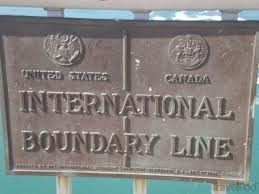 On Wednesday, August 7, 2013, John Norman Collins (JNC) finally got around to asking his Canadian first-cousin what he had been edging towards for months, sponsorship for an international prisoner exchange.
On Wednesday, August 7, 2013, John Norman Collins (JNC) finally got around to asking his Canadian first-cousin what he had been edging towards for months, sponsorship for an international prisoner exchange.In letter after letter, JNC stresses in elevated and maudlin detail the close personal and emotional ties that bind him and John Philip Chapman together. "I love you, Little Brother" is the most common refrain in his letters. JNC repeatedly plays the "happy family card" and John Philip quietly accedes.
For his part, Chapman did little to discourage Collins' line of thinking because it kept the door open for his older cousin to reveal more details about his complicity in some of the other murders he is thought to have committed but was never charged with.
Chapman was secure in the thought that this "sponsorship" ploy was pure delusion on the part of his cousin. After all, Cousin John had attempted the same thing in 1981 to circumvent the Life Sentence decreed by The People of The State of Michigan, and he had failed.
So you can imagine how Chapman felt when JNC sent him a copy of a letter he had written to a Canadian Immigration official in Ontario, Canada, a mere month after he had approached Chapman for his help.
__________
Marquette Branch Prison
John Collins/Chapman 126833
Sunday, September 8, 2013
Honorable Frank Dale:
First of all, I'd like to thank you for your much needed participation and support in my transfer effort to get back home to Canada. Perhaps my cousin, John, has already told you that I tried transferring back to Canada in 1981, under the Prisoner Exchange Treaty between the USA & Canada. That turned out to be a real disaster for me.
Back in 1980, I applied for a transfer and Mr. Douglas Frame was the Canadian Consul at the time. I explained to him that I had a "HIGH PROFILE" case and that it was important for him to move quickly in an attempt to keep my transfer from becoming a "MEDIA CIRCUS."
Mr. Frame assured me that there wouldn't be any problems and that all of his previous transfers went without a hitch. Once again, I explained my position to Mr. Frame and he assured me once again that there wouldn't be any problems.
Instead of processing my paperwork immediately, Mr. Frame chose to wait several months before coming to visit me. He told me that he and his son were coming up here on a fishing trip and he would visit me then. Those EXTRA COUPLE OF MONTHS cost me my transfer.
 Initially, Michigan approved my transfer and so did Washington, who forwarded the paperwork to Canada (Ottawa) for final approval. The paperwork sat on the desk of the person that was supposed to sign the papers for another month because he was off in a foreign country trying to get a relative transferred back to Canada on drug charges.
Initially, Michigan approved my transfer and so did Washington, who forwarded the paperwork to Canada (Ottawa) for final approval. The paperwork sat on the desk of the person that was supposed to sign the papers for another month because he was off in a foreign country trying to get a relative transferred back to Canada on drug charges.During that time, the MEDIA learned about my transfer and the victim's family contacted their State Representatives who applied pressure on the Michigan Department of Corrections (MDOC). At that point, I had already been transferred near Detroit for my Verification Hearing and appointed an attorney to represent me.
I thought I was on my way Home. Instead, Michigan rescinded my transfer on the grounds that Canada had not FINALIZED my paperwork yet. Needless to say, I was devastated as was my family over in Canada.
On the "POSITIVE SIDE" right now is the fact that the Attorney General (of the United States), Eric Holder, and the Michigan Governor, Rick Snyder, have BOTH come out vocally and said that we have too many people in prison. They spoke about releasing those with Minor Drug cases and the Elderly inmates that are costing the taxpayer way too much money. Hopefully, that will play into our hands this time around.
The MDOC will simply say that LIFERS will not be transferred because of me. If we get Governor Snyder to APPROVE my transfer, then it is out of MDOC's hands. The USA only honor treaties when it is convenient for them....
In closing, I would once again like to thank you for your support. Hopefully, I'll be able to one day "SHAKE YOUR HAND" in person. My dream is to die on Canadian Soil!
Respectfully,
John Collins/Chapman
__________
The conclusions of the above letter bear closer examination.
JNC's Canadian family was not "devastated" about Collins being refused his transfer to Canada in 1981. In point of fact, both his birth father and his uncle declined to sponsor John for the international transfer.
And although it is true that a delay did occur in the processing of JNC's transfer application, the official reason for the MDOC veto was sent to John Norman Collins on January 20, 1982. Then Deputy Director of MDOC, Robert Brown, Jr. wrote:
"I recently learned through diplomatic channels that you would have minimal family contact if in Canada since most of your family lives here in the States. Further, you spent the majority of your life here in the States.
"Since the main purpose of the treaty is to provide for re-integration into society and since this re-integration would not be possible in Canada, I am revoking our consideration of your transfer request."
__________
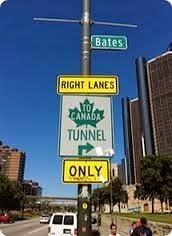 Detroit/Windsor Tunnel
Detroit/Windsor TunnelOne common trait of serial killers is that they learn from their mistakes. Had John Norman Collins gotten any smarter in forty-two years?
For more background on JNC's former border bid, view this link:
http://fornology.blogspot.com/2013/11/the-canadian-dream-of-john-norman.html
Published on January 04, 2014 00:00
December 30, 2013
John Norman Collins Canadian Connection

When I'm speaking to people about the Washtenaw County murders, I am usually asked, "Have you been in contact with John Norman Collins (JNC) or any of his family?"
My answer is always the same, "I've made many attempts without success."
JNC's older brother and sister have been steadfast in their silence about their notorious younger brother. Neither of John's siblings bear any responsibility for what their brother was accused of doing; regardless, they both have paid a heavy personal price and are victims of the collateral damage from the very public court case. They have chosen not to comment, and that is well within their rights.
The Collins' family wall of collective silence is a legacy from their mother, Loretta, the family matriarch. She was the sole ruler and spokesperson for the family during her son's trial and after. Not even John was allowed to speak in his own defense. Now that she is gone, there is no one to speak for the family.
My researcher and I had just about given up establishing contact with anyone in the Collins clan when I received a surprising email from an unexpected and unsought for source.
"Please allow me to introduce myself. My name is John (Philip) Chapman; I am John Norman Collins' (Canadian) cousin. I have been in contact with my cousin since 1981, 32 years now... and I do have some interesting facts I would be willing to share with you pertaining to John's (Canadian) family history and facts that he has revealed to me.
"I normally would never get involved, however, after reading your blog post (Treading on the Grief of Others in the John Norman Collins Case), I do agree that 'a debt is owed to history that must be paid'.
"My heart truly goes out to those young women and their families who had their daughters taken away from them too soon. If there is anything I can share with you to help, I would be more than happy to do so."
This was almost too good to be true. John Philip Chapman appeared exactly when we needed him most. My researcher and I had been working for three years to get someone from the Collins family to speak with us about John's childhood and early family history.
We discovered that Chapman had a personal motive for contacting me. His uncle, Richard Chapman, was JNC's Canadian birth father from Windsor, Ontario.
John Philip Chapman wanted to correct a long held misperception about his Uncle Rich. Previous published accounts of this case have noted and repeated that Mr. Chapman was a drunk who deserted his family.
 Richard Chapman in 1944 on motorcycle seen with his friend, Fred Higgins, who saved his life.
Richard Chapman in 1944 on motorcycle seen with his friend, Fred Higgins, who saved his life."Nothing could be further from the truth. My Uncle Rich lost his left leg in 1944 during the Second World War. He also suffered from Battle Fatigue and other maladies of war. The medication he was on for the rest of his life would not allow him to tolerate alcohol. It would have killed him, yet my uncle lived until 1988."
Staff Sergeant Richard Chapman served in His Majesty's Canadian Services, unit #152. He was a light-infantry officer and an explosives/demolition expert. After his injury, he spent weeks in a military hospital recovering before he was returned home.
"I want to take the opportunity to correct a historical inaccuracy. War changes people, however, my Uncle Rich was never abusive towards his children or my Aunt Marjorie. He never abandoned his children and never would.
"My Aunt Marjorie's (Loretta Collins) family had money, and they felt that Uncle Rich was not good enough for their daughter. He wasn't Catholic. Her parents didn't like their son-in-law, to say the least, and they offered him money to disappear.... I know for a fact that my Uncle Rich never took the money, but because he didn't want to drag the children through a messy divorce, he gave Aunt Marjorie what she wanted (full custody).
"Uncle Rich loved his children very much... however, due (to) the amount of lies Aunt Marjorie had put in their heads, they didn't want to be bothered by their dad, with the exception of (his daughter). She learned the truth before her Dad had passed away."
If I wanted to learn more about the Chapman side of the family, John Philip suggested I call him or speak with him in person. First, I made a sixty minute phone call to Canada to satisfy myself that he was the real deal.
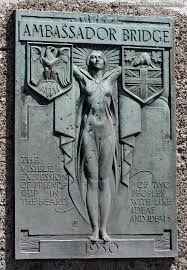 Then, my researcher and I arranged to meet with Chapman in Canada on my next trip to Michigan. A month later, in June, we drove across the Ambassador Bridge from Detroit into Windsor to see what we could learn about the early years of JNC's family.
Then, my researcher and I arranged to meet with Chapman in Canada on my next trip to Michigan. A month later, in June, we drove across the Ambassador Bridge from Detroit into Windsor to see what we could learn about the early years of JNC's family.Ryan M. Place and I spent over two hours talking with John Philip and his mother, who was the sister-in-law of Marjorie (Loretta Collins) Chapman, JNC's birth mother. When Loretta was living in Canada, she was known by her middle name, Marjorie.
We had a wonderful afternoon meeting with the Chapmans; they were warm and inviting. John Philip explained to us that he had been writing his cousin John (Collins) in prison since he (Chapman) was seven or eight years old.
"(Collins) is twenty-five years older than me and has always been like a big brother to me. In our letters, he refers to me as 'Little Brother'."
John Philip Chapman further explained that he was an only child and found comfort in the attentions from his older American cousin who became a virtual 'Big Brother' to him.
Now forty-one years old, Chapman's personal search for knowledge about his cousin was making him confront his deepest fears. Over the years, Chapman had maintained a "Don't ask - Don't tell" policy regarding his cousin's imprisonment.
After all, Collins had insisted that he was innocent of the Karen Sue Beineman murder. He also complained in his letters that he was victimized by a rogue cop (Sheriff Douglas Harvey), an overzealous prosecutor (William Delhey), and a corrupt legal system.
After sharing information with the Chapmans for a while, we went through several family photo albums with faded snapshots and Polaroids from back in the day. It was interesting and vaguely voyeuristic to peer into their family history.
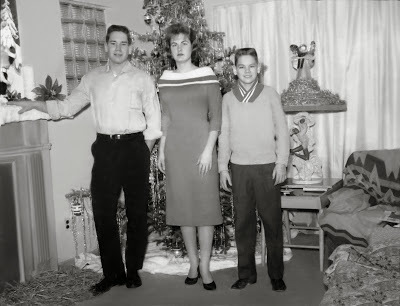 John Norman Collins (13), his brother (16), and sister (15) - December 30th, 1960 - fifty-three years ago today.
John Norman Collins (13), his brother (16), and sister (15) - December 30th, 1960 - fifty-three years ago today.As Ryan and I were getting ready to return to the states, John Philip asked if we would be interested in receiving some of his cousin's prison letters. Chapman had noticed a change in tone and intensity in the letters lately, and he wanted me to take a look at some of them.
We couldn't believe our good fortune - again! Then, John Philip volunteered something unexpected. He offered to see what other information he could find out for us from his cousin about his crimes.
Without JNC's knowledge over the next four months, we received a total of nine prison letters and a half-dozen emails from Collins to his cousin, most only days after Collins had mailed them from Marquette Branch Prison.
The letters average seven pages each and cover a myriad of subjects, but one theme became more and more prevalent as time went on. Collins was pressing for an international prisoner exchange with Canada, once again.
He had tried unsuccessfully in 1981. Collins was born in Canada, which was the basis for his naturalization claim, and he said he had relatives and a support system there. Canada has more liberal sentencing provisions than the United States, so a parole was a very real possibility.
But both JNC's father and his uncle refused to offer Canadian sponsorship to him after being contacted by authorities on both sides of the Detroit River informing them of the details of John's crimes. The Michigan Department of Corrections summarily revoked Collins' application for an international prisoner exchange.
Thirty-two years later, Collins summoned up the courage to ask his younger first-cousin, his last Canadian blood relative, to sponsor him for another prisoner transfer attempt in hopes of receiving dispensation for timed served. To his way of thinking, all he needed was a relative and a place to stay; then, he would be assigned to a work release program in Canada and be free of his prison cell.
Now, it became clear to Chapman what JNC had been driving at for months; the chicken hawk wanted to come home to roost.
Link to the above mentioned blog post:
http://fornology.blogspot.com/2013/06/treading-on-grief-of-others-in-john.html
Published on December 30, 2013 08:07
December 25, 2013
John Norman Collins Mail Call - Coming Clean With My Readers

For three and a half years, I have focused most of my worldly attention on researching and writing about John Norman Collins (JNC) and the Washtenaw County murders of 1967-1969.
I would have been finished with The Rainy Day Murders six months ago but for an unforeseen development which I have been holding back from my readers.
My researcher, Ryan M. Place, and I have privately received over twenty prison letters and a handful of emails from two separate sources that JNC had written to from April 2013 until October 2013.
The first cache of letters we received was from a woman who had been corresponding with JNC for close to a year. Sandra contacted us when Collins agreed to answer some of our questions through a third party, his current girlfriend, Sandra.
We had written Collins numerous times asking for an interview, but he decided to use Sandra as a virtual "human shield" to play games with us. I am sure he believed that going through her would give him some level of control over the interview, but in reality, it was merely weak dealing.
Collins believed he had a firm grasp on her, but his glib, evasive, and sometimes disturbing answers to our written questions about the young women's murders began to turn her off, and she began to internalize her feelings about the defenseless victims of his carnage. What he said and how he said it was upsetting to her.
He began making lewd remarks in his prison letters. Rather than "charming" her with his sweet talk as he had been doing, he suddenly became vulgar and suggestive which bothered her.
Finally, Sandra wrote to us saying she was through with Collins. Then she surprised us with an offer we couldn't refuse, "Would you like me to send you some of his prison letters?"
"Yeah!"
Ryan and I couldn't believe our luck. Here was an exclusive information drop handed to us. Primary resource material is the meat of research, and now we had some prison letters from JNC himself. Sandra sent us twelve personal letters and many pages of notes she had taken from several "collect" phone calls Collins had made to her from the prison yard.
Disgusted with him, Sandra finally told Collins that she had sent us the letters he had written to her. The master manipulator had been double-dealt and he was furious.
Some days afterwards, in a phone call to me, Sandra said that John had called her back and apologized profusely. He said he had been under a lot of stress lately and needed to talk with her face-to-face, necessitating a visit to Marquette prison.
"It's URGENT!" he told her.
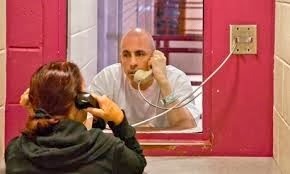 Stock Photograph - Depicts High Security, Non-Contact Visitation
Stock Photograph - Depicts High Security, Non-Contact Visitation For some unspecified reason, she recanted and drove several hundred miles up to Michigan's Upper Peninsula to finally face the prison inmate she had been writing for months. Although I wasn't made privy to their entire conversation, I do know this, JNC asked Sandra to marry him.
That is the last thing we have heard from Sandra. Her phone is still connected, but she isn't answering our calls.
Then something even more remarkable happened. In May of 2013, I received an email from a person who claimed to be JNC's last living Canadian blood relative. He had been investigating the internet for information on his infamous cousin and read several of my recent blog posts about him.

The Canadian emailer wanted to correct the mistaken perceptions concerning his Uncle Rich, the Canadian birth father of John Norman Collins. What had been previously printed about his uncle was blatantly inaccurate, and he wanted me to set the record straight in The Rainy Day Murders.
More about the JNC Canadian family connection in my next post.
Published on December 25, 2013 17:40



